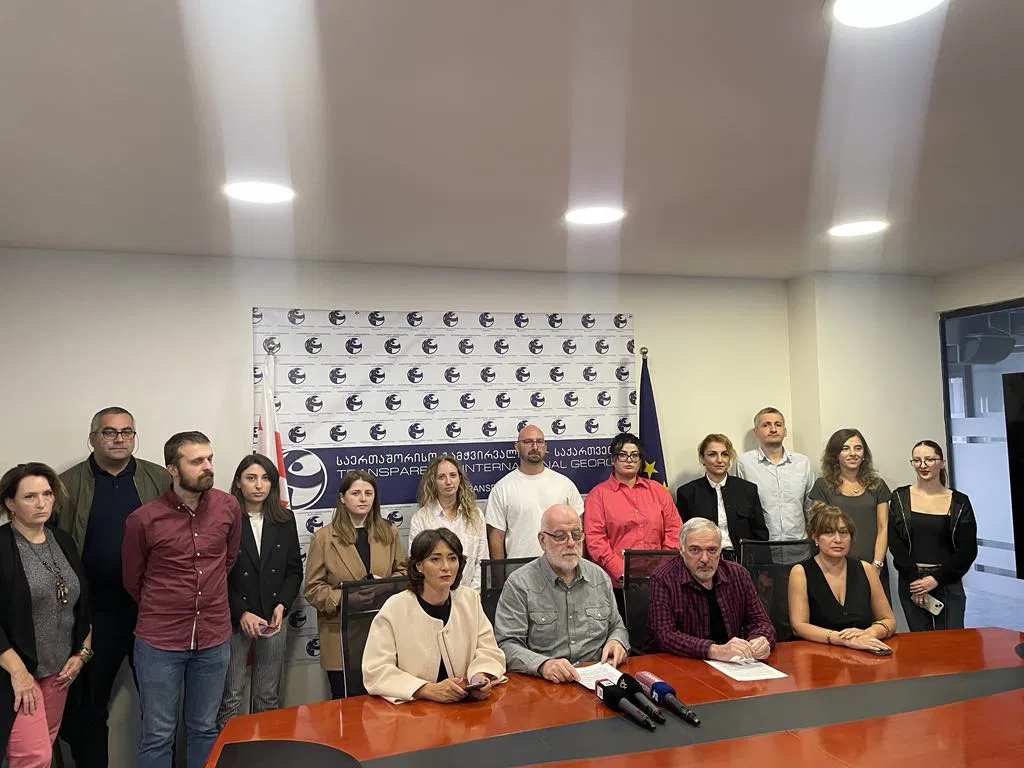Transparency International Georgia’s interim report on “Misuse of Administrative Resources for Parliamentary Elections in 2024” was released on October 21. The monitoring took place from July 1 to 15 and revealed that the line between ruling party and state had been effectively erased. This is a serious problem for the fairness of election environment.
Misuse of Legal Administrative Resource for Electoral purposes
TI-Georgia highlights instances of misuse of legal administrative resource for electoral purposes in the year 2024.
* Adoption of “Russian Law” : The watchdog notes the government passed the controversial law on foreign influences despite protests and critics from Western partners. This law restricts freedoms such as expression, association and privacy and affects electoral processes.
* Changes in the CEC Composition Rules. The organization emphasizes that the amendments allow the ruling party to select Central Election Commission members with no opposition input. This undermines electoral fairness, and draws criticism from international organizations like the OSCE/ODIHR.
* Abolition Gender Quotas. The watchdog mentions also that the government removed the gender quotas in parliamentary and local election, overruling President’s veto. This accelerated the legislative process.
* Expansion of Anti-Corruption Bureau Powers. New powers granted to the Anti-Corruption Bureau through the changes to the Organic Law on Political Associations of Citizens allow it to cancel party registrations, request sensitive information, and confidential banking information. This raises concerns about privacy of personal data, banking laws, as well as constitutionality, according to the report.
* Introduction of the Institute of “Delegates”. A new electoral rule replaced majority deputies by “delegates” chosen by parties. The watchdog claims that this change alters electoral representation.
* The CEC changed when precinct members were assigned duties, reducing transparency on election day.
* Zviad Kharebashvili’s Assignment: A notorious U.S.-sanctioned police official, known for violent crackdowns, was assigned to lead the election security groups (so-called Territorial Groups), raising concerns about possible voter intimidation.
* Problems with Election Legislation: The government’s frequent changes to election laws right before elections violates international standards and destabilizes the legislative framework.
Misuse of Executive Administrative Resource for Electoral Use
The watchdog also highlights instances where executive administrative resources are being misused for partisan purposes in 2024.
* Unlawful decisions of “Independent institutions”: TI-Georgia cites the Anti-Corruption Bureau and the Communications Commission for allegedly favoring the Government and harassing the Civil Society and Media critical of the Government.
* Illegal decisions of the ACB – TI-Georgia’s “declared election goals” were labelled by the ACB, which disrupted the organization’s pre-election monitoring. The decision was later reversed, but it still affected the organization.
* Harassment by ComCom of critical media: TI-Georgia notes ComCom’s heavy fines on broadcasters who refused to air Georgian Dream content or aired Euro-integration ads, which “exploited the tragedy of Ukrainians” or “portrayed NGO representatives including election monitoring organisations in an unethical unfair and misleading context”.
* Violence Against Opposition Parties : TI-Georgia reports groups linked to ruling party attacked opposition representatives including members of “National Movement”, “Coalition for Change” and “Gakharia for Georgia.”
* Criminal Influence on the Voter Will. TI-Georgia documents ongoing voter manipulation including threats, ID confiscation and vote-buying.
* Illegal Scheme to Collect Personal Data of Public Servants: TI-Georgia claims that public officials have been forced to collect their personal data in order to ensure their votes for Georgian Dream.
* Illegal Scheme to Collect Personal Data in Adjara. TI-Georgia, based on information from whistleblowers, reveals that Georgian Dream processed sensitive data of tens and thousands of Adjara Residents before the election.
* Smear against Civil Society Activists TI-Georgia reports a aggressive smear against local civil societies organizations, with defamatory poster and a website launched in order to vilify activists who are critical of the ruling parties.
Misuse of Institutional Administrative Resource for Electoral Use
Transparency International Georgia highlights a number of instances of misuse of institutional administrative resource for partisan purposes in 2024.
* Participation by candidates of the ruling party in budgetary events: TI-Georgia reported that “Georgian Dream'” candidates participated in state or locally funded events (e.g. infrastructure projects, awards ceremonies) as part their campaigning. These events blurred the lines between the state and ruling party by using public resources to promote candidates for parliamentary positions.
* Mobilization Public Servants to Attend Pre-Election Gatherings of the Ruling Party: TI-Georgia notes that civil servants, as well as employees of budget-funded organisations, were mobilized in order to attend pre-election gatherings of “Georgian Dream”. This practice may have forced public employees to participate against their will in campaign activities.
Misuse of Financial Administrative Resources to Electoral purposes
TI Georgia cites several instances where the ruling party has used budgetary funds to support electoral campaigns. The watchdog identifies twelve large-scale socioeconomic initiatives of the government and public organizations that appear to have an electoral motivation. These initiatives, funded from state and municipal budgets blur the line between state and “Georgian Dream”, giving the ruling party a unfair advantage. Some examples include allocating GEL 250.000 to honor successful Georgians, GEL 20,000,000 for local projects and various social aid programs within Adjara.
Watchdogs provide recommendations
Transparency International Georgia’s report recommends that the government maintain the stability of the electoral codes and avoid frequent changes, especially within a year of an elections, and also calls for the incorporation of outstanding recommendations from OSCE/ODIHR, and the Venice Commission.
The watchdog emphasizes that any changes to electoral code should be preceded with broad consultations among political parties, civil societies and experts.
The organization also notes the need for law enforcement agencies to investigate violence or pressure in relation to the electoral process swiftly and impartially, and to revoke the unconstitutional power granted to the Anti-Corruption Bureau regarding party registration. The Central Election Commission should not adopt laws that are in conflict with higher legal acts and should not allow sanctioned individuals to participate in the election process.
TI Georgia also believes that the Communications Commission should stop harassing media critics and monitor political ads for hate speech. Law enforcement agencies must investigate allegations of electoral violations. They should also refrain from mobilizing civil service employees for ruling party events.
TI-Georgia emphasizes that the relevant law enforcement authorities should conduct timely investigations on allegations of vote buying and other attempts to influence voters’ will, interference with normal election campaigns of parties, physical assaults, showdowns, or other acts against representatives of opposition party.
HR/VP Borrell: The Georgia elections will be the moment of truth
Read More @ civil.ge




